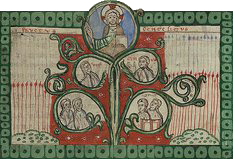Inter-cultural Transmission of Intellectual Traditions in the Middle Ages and the Early Modern Period. A comparative perspective
Participants
Klementyna Glińska

An intellectual revival, clearly remarkable in the Western Europe in the end of 11th and persisting until the end of the next century, enable the researchers to define this period as the “12th-century renaissance”. One of the most important cultural centres of the time was the Loire Valley – it was the place where the studies on Greek and Roman traditions were reborn. Grammarians, poets, logicians and philosophers with new power and audacity accepted the challenge of reinterpretation of their “pagan” heritage. A new quality of poetry was among the results of the renewed lecture of ancient texts: classicist, inspired by Virgil, Horace, and, above all, by Ovid, the “modern” Latin poetry manifested its innovative spirit, a conscious and proud novelty in relation to the old rules and licences. With these tendencies we can also associate the arise of the new form of Ovidian poetry, called i.a. ‘comedia’. The authors of these elegiac, narrative compositions not only followed the authority of Ovid but also competed with Menander and Plautus. Contemporary knowledge of the repertoire of texts accessible to 12th-century readers tell us to doubt, whether the poets had a direct contact with the sources recalled. It is indeed the case of Plautus’ Amphitruo and Aulularia, evoked by Vital of Blois as the models of his Geta and Querolus. Similarly, we can be almost sure that a “new Menander”, William of Blois, the abbot of the Benedictine monastery in Calabria and the author of the comedy Alda, did not use the original, after all unidentified text of Greek comedy. The interpreters of his work tend to see in his inspiration a Latin transposition of Sicilian or Calabrian origins or a Latin synopsis of the Androgyne. The biographies and works of poets originated from the Loire Valley constitute a part of panorama of inter-cultural, Greek-Latin-medieval, relations in the 12th–century Europe, the interpretation of Latin Comedies give us an insight into the transfer of ideas and literary paradigms between the cultures of Antiquity and Middle Ages, as well as the 12th-century cultures of the West and the East. The objective of my inquiry is to give a comprehensive description of the meaning and the functions of Greek and Roman traditions in the 12th-century Latin Comedies. The tradition in question embraces poetic paragons, as well as the ideas modified and adapted by the medieval poets, resulting in the initiation of a entirely new poetic quality. In my investigation I will employ a philological method, as well as rhetorical and comparative analysis.
Klementyna Aura Glińska is PhD student in medieval studies at the Paris-Sorbonne University (Paris IV), Ancient and Medieval Worlds, and at the University of Warsaw, Institute of Classical Studies. She is member of the Société Internationale pour l'Étude du Théâtre Médiéval (SITM) and of the Scientific Society Collegium Invisibile. The primary focus of her research is on the rhetorical culture of the 12th century in the Western Europe, with special reference to the cradle of the “12th-century renaissance” – the scientific circle of cathedral schools of the Loire Valley. Her studies covers the field of Latin medieval poetry and prose (in frames of the trivium), as well as the medieval performative arts. These particular interests are inseparable of the reflection on the orality and literacy, scholarly and religious institutions, and the inter-cultural transfer of knowledge and traditions in the medieval Europe.



